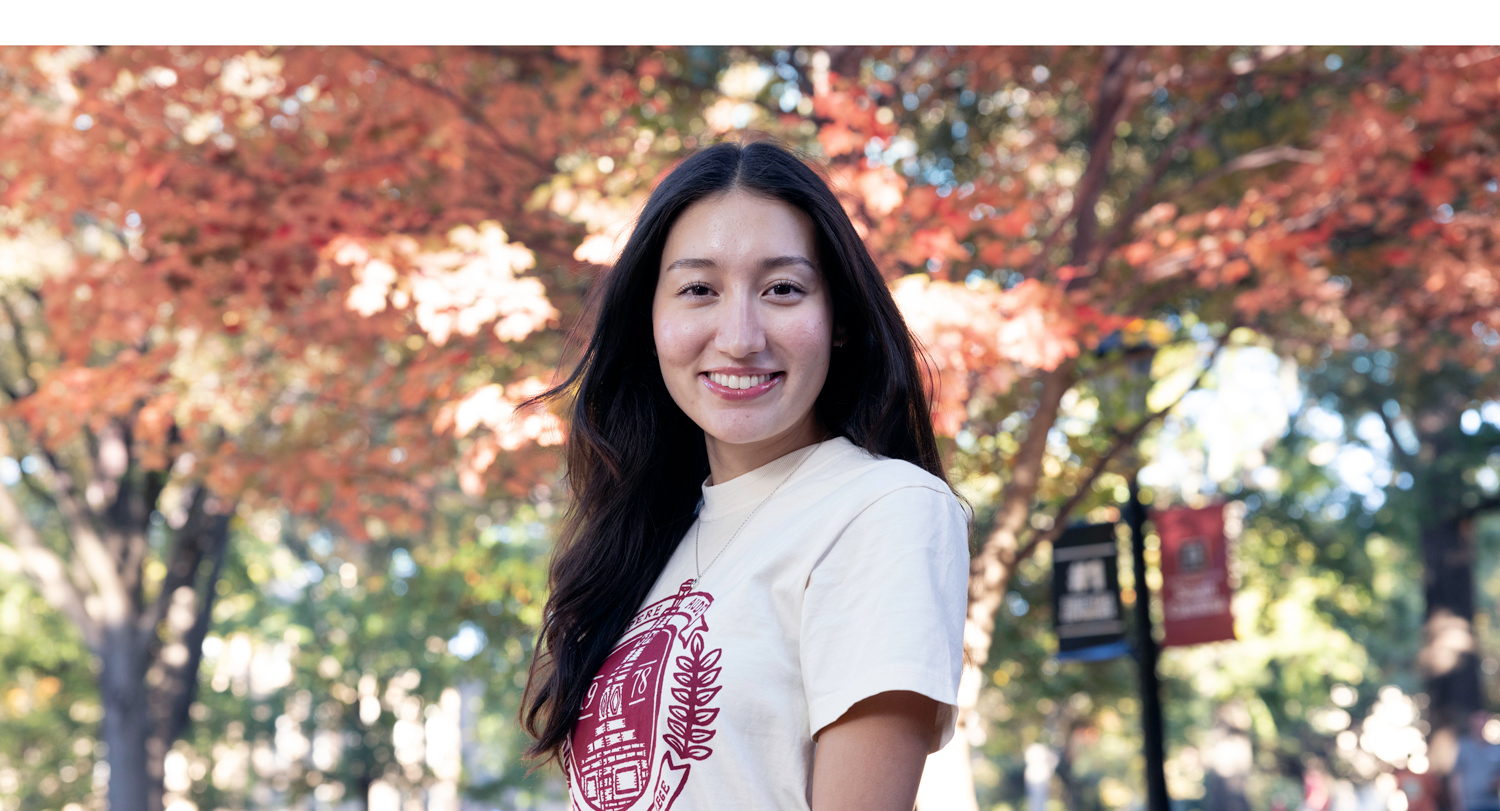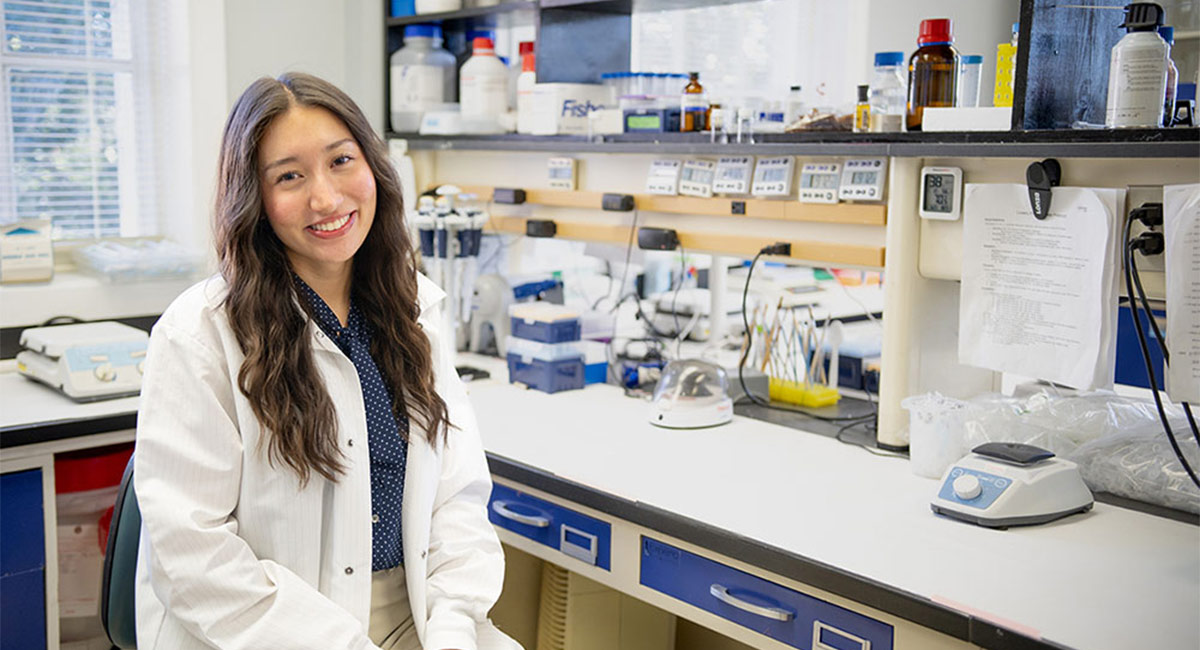
The long-running joke among Hannah Brennen’s family and friends is that she’s never had any downtime. So, her crazy busy schedule now, in her senior year at the South Carolina Honors College, is just normal life for the public health major.
Consider her calendar before — and during — her days at the University of South Carolina.
- In high school, she spent five days a week excelling in her public school classroom, followed by Saturday classes at Japanese school.
- Brennen is fluent in English, Spanish and Japanese. And she’s learning Portuguese “just for fun.”
- She is a Stamps scholar at USC, recipient of one of the university’s top merit awards that provides funding and opportunities for experiences inside and outside the classroom.
- At USC, she’s a university ambassador, while her research at the School of Medicine Columbia and the sociology department led to co-authoring two publications. She is the president and founder of the USC Prenatal Vitamin Care Club, and through her work with PASOs, a community health worker organization affiliated with the Arnold School of Public Health, she has led the distribution of prenatal vitamins for South Carolina’s Latino communities.
And the latest addition to the list: plans to attend medical school to become an OB-GYN after being a finalist for the Rhodes scholarship.
Not too bad for a first-generation college student from Knoxville, Tennessee.
A bilingual upbringing
Brennen was raised in a “bilingual-bicultural household.” Her mother grew up in a small, rural town on the southernmost island of Japan, with “rice paddies as far as the eyes can see,” Brennen says. Her father is a U.S. Navy veteran who was stationed nearby.
“It was before Google Translate, so they would take dictionary books on dates,” she says.
After a year and a half together, her mother came to the U.S. where the couple eventually settled in Knoxville and Brennen and her younger brother were born. At home, her father speaks English and her mother speaks Japanese.
The emphasis on education and the connection to her family’s cultural heritage started early. Along with going to school five days a week, Brennen attended Japanese school each Saturday, starting when she was 5 years old.
“It was really to make sure that I could communicate with my grandparents, but it was beautiful to open up to this whole new world of culture and customs and language,” she says. “The school is meant particularly for Japanese students, and I learned a lot about hard work, perseverance and about not being the smartest person in the class all the time.”
It also helped grow her interest in caring about communities of immigrant populations, something that stayed with her as she looked at college options and thought about her career.
“I looked only at big state schools in the Southeast that had full-ride scholarships,” she says. “I’m a first-generation college student and my family didn’t have a lot of money to send me to college. And I was always looking toward going to medical school, so I knew that was another large expense that was probably heading my way.”
She found what she was looking for at USC, with a top honors college and public health program. The Stamps scholarship provided the funding for her studies and the South Carolina Honors College put her on the road to outreach and research.

Brennen traces her commitment to medicine — particularly women’s maternal health — to an experience she had in high school, shadowing an OB-GYN in her hometown. She remembers walking into a delivery room where a woman was about to give birth.
“It's a really intense moment. She's actively laboring and everybody's crying. And this baby comes out. It's genuinely the most beautiful thing I've ever seen,” she says. “It was a beautiful birth. Everything went perfectly. And I started crying, because it was one of those moments where it was so profound to me that that's exactly what I wanted to be a part of. What I want to help facilitate and protect for the rest of my life is this kind of connection between the mother and the baby, and ensuring that every birth can be as beautiful as that one.”
She’s taken steps through her coursework and research at the Arnold School of Public Health to work in maternal health and disparities in access to care. South Carolina has the 8th highest maternal mortality rate in the U.S., with 13% of its counties considered maternal care deserts.
“So it was important to me that I didn't just sit idle learning about these things in my public health courses,” she says.
That’s what led her to partner with PASOs, a Columbia-area community health worker organization affiliated with USC that works with the Latino population to promote health, advocacy and leadership development. Work in the research lab at the USC School of Medicine Columbia alerted her to the impact prenatal vitamins have on preventing neural tube defects, a condition faced in higher numbers by the Latino population.
“Knowing that I'm just a college student and I'm not Hispanic myself, how can I have trust with these communities and help them in a way that is culturally sensitive and is something that would work for them and that they want? And so it was important to me that I went to PASOs, talked to professors, talked to physicians in the community to make sure that this was an intervention that people would actually want. And that it was realistic. And thankfully, PASOs said ‘this sounds right up our alley’ when I pitched my project idea to them.”
As part of her work, Brennen wrote a successful public health grant to obtain prenatal vitamins that have since been distributed across South Carolina, with plans to expand into North Carolina.
Next steps
As she prepares for her final semester at USC, she is in process of applying to medical schools. And through all of the preparation and finalist interviews for the Rhodes scholarship held earlier this month in Atlanta, she is more sure than ever of her decision to attend USC.
“I love being a Gamecock. Everything that has been afforded to me, I really do attribute to this university and the people that I've met here.”
"I think USC is the best community ever,” she says. “USC is unique in that we're a flagship institution that's good at a lot of things. And with the location in the capital city, we have so much going on that it's almost opportunity overload.”
She said mentors have helped her be selective in choosing the areas where she spends her time, and she believes the university does a good job producing well-educated, intelligent students who also know how to have some fun.
“I think Honors does make it feel like a smaller campus, and I don't know if I would be here without Honors and Top Scholars, just because of the scholarship programs that I was afforded. But I think that USC is also good at making communities like that everywhere. There’s Capstone, there’s club athletics, there’s different living and learning communities,” she says. “So, Honors has been that for me. But I do think that people can get what they need anywhere here at USC.
“I love being a Gamecock. Everything that has been afforded to me, I really do attribute to this university and the people that I've met here.”